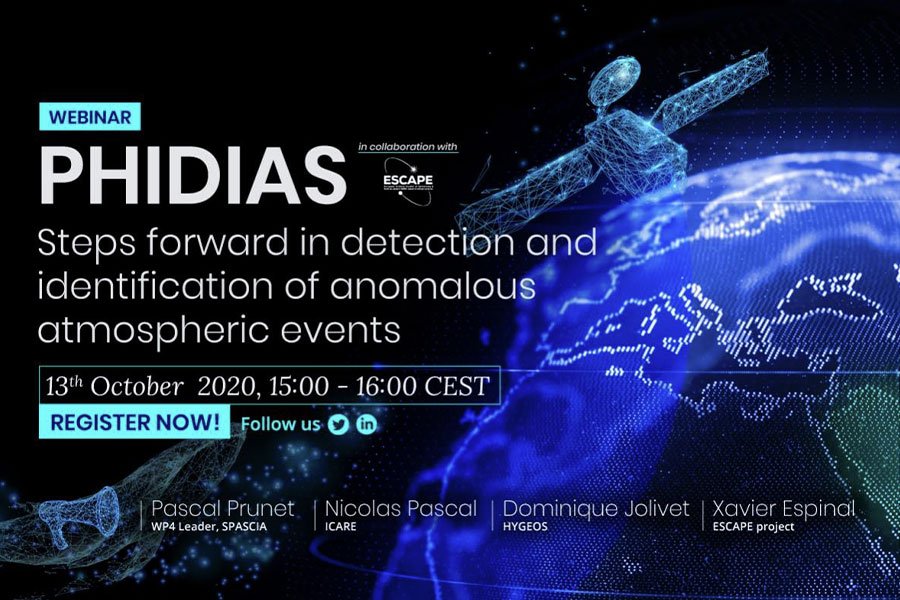
Oct 13, 2020 to Oct 13, 2020
|
Conferences & Events

Detrimental environmental change has been receiving a great deal of attention in the news media for some time. Rapidly evolving satellite data provide opportunities for the monitoring of changing environments and a new engine for scientific discovery.
From 2021, European atmospheric sounds missions will deliver each day several terabytes of raw datacubes at high spatial/temporal/spectral resolutions. This represents an unprecedented amount of atmospheric data. A key challenge is to provide scientists and users with approaches and capacities to comprehensively deal with all the available information.
PHIDIAS has set up a data area testing case in "Intelligent screening of a large amount of satellite data for detection and identification of anomalous atmospheric composition events", which will demonstrate new approaches for detecting, filtering and qualifying scenes and events of interest among the incoming flux of satellite atmospheric data, in view of their dedicated exploitation. Innovative methods for the analysis of atmospheric satellite data are associated with high performance computing (HPC) and high performance data analytics (HPDA) capacities for developing intelligent screening approaches in an operational context, for the detection of extreme atmospheric composition events such as wildfires, urban pollution episodes, industrial incidents, etc. and the monitoring of their impact on air quality and climate.
PHIDIAS is organising a webinar entitled "Steps forward in detection and identification of anomalous atmospheric events" to be held on Tuesday 13th October 2020 at 15:00 to 16:00 CEST, in collaboration with the ESCAPE project . The webinar aims to showcase how PHIDIAS is going to improve the usage of HPC and high performance data management services for the development of intelligent screening approaches and the exploitation of large amounts of satellite atmospheric data in an operational context.
In an effort to build a synergy with PHIDIAS's community and increase ESCAPE's visibility, Xavier Espinal, leading the activities on the development of the ESCAPE Data Infrastructure for Open Science (DIOS), will have a dedicated session in the webinar to present the ESCAPE DIOS service to the PHIDIAS community, share its development status, its contribution to foster Open Science and its approach of combining and storing atmospheric data from space.
| Time | Title | Speaker |
| 15:00 - 15:05 | Introduction of the PHIDIAS project | Francesco Osimanti, Trust-IT Services, PHIDIAS WP7 Leader |
| 15:05 - 15:15 | Thematic and objective: proposed approaches and available Sentinel measurements | Pascal Prunet, SPASCIA & PHIDIAS WP4 Leader |
| 15:15 - 15:25 | HPC/HPDA Infrastrucuture and capacities for implementing intelligent screening in an operational context | Nicolas Pascal, ICARE & SPASCIA Technical Partner |
| 15:25 - 15:30 | Q&A Session | |
| 15:30 - 15:40 | Implementation of processing and products | Dominique Jolivet, HYGEOS & SPASCIA Technical Partner |
| 15:40 - 15:50 | ESCAPE: A dive into a Datalake for Open Science | Xavier Espinal, CERN & ESCAPE project |
| 15:50 - 16:00 | Q&A and Closing Remarks |
Download Xavier Espinal's presentation: ESCAPE: A dive into a Datalake for Open Science